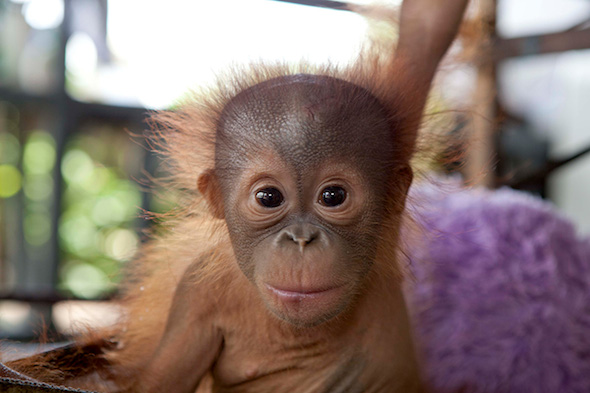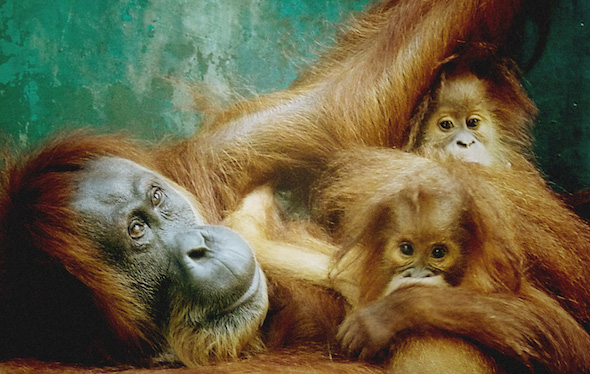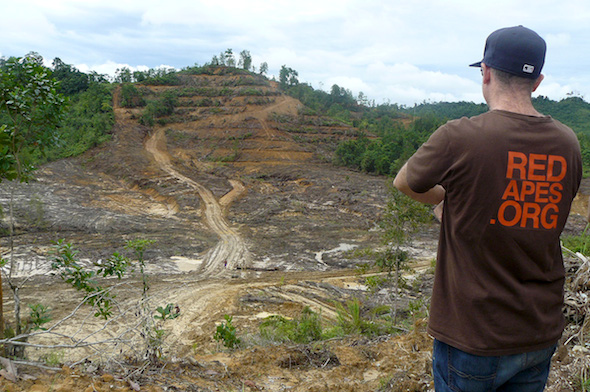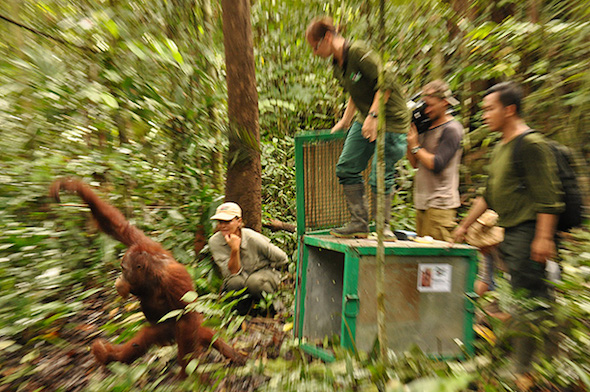This guest blog is by Rich Zimmerman, Executive Director of Orangutan Outreach. Rich helped facilitate getting CSNW an iPad as part of their Apps for Apes program! He is our first guest blogger to tell us information about our red ape cousins in Asia. Rich’s experience is in helping raise awareness and funds for the projects in the field. He has accompanied a few rescue missions in Borneo but his work is mainly in New York and online—advocating on behalf of orangutans, promoting the cause and communicating the critical need to help them before it’s too late.
—
What inspired you to work with orangutans?
I’ve loved orangutans since I was a child. I went in a different direction professionally and it was only later in life—when I realized just how perilously close the orangutans were to extinction in the wild—that I decided I needed to do something to help them. After traveling to Indonesia and seeing the utter devastation to their forests and the rescue center cages full of hundreds of orphaned and displaced orangutans staring out with such sadness and desperation in their eyes, I decided to dedicate my life to helping them. I created Orangutan Outreach in 2007 as a way to raise awareness of the crisis facing wild orangutans and to raise funds for the rescue projects in Borneo and Sumatra.
Can you tell us a brief story about an individual orangutan that was personally affected by human encroachment?
Every orangutan in every rescue center has been affected by human encroachment. Whenever there is a conflict, the human always wins. Orangutans—and elephants, rhinos, tigers, monkey, you name it—always fall victim to the constant expansion of human settlement and the destruction of their habitat by logging, palm oil, and mining companies. Every baby in a rescue center was torn off his or her dying mother. These innocent babies are traumatized—just as any human baby would be if pulled from its mother. And for each infant confiscated and brought to a rehabilitation center, it’s estimated that anywhere from four to nine did not survive. It’s horrific what is being done to these creatures… for no fault of their own they are being wiped out of existence by humans.
Let me tell you two quick stories. The first is Rickina, who was rescued by our partners International Animal Rescue (IAR) when she was less than a year old. When they confiscated her she has a gaping machete wound in her skull—obviously received when the poachers killer her mother. The wound was fresh. Rickina is now doing really well—thanks to the expert care of the team at IAR Ketapang. She is quite famous online—with more than 350,000 views of her video on YouTube.

Baby Orangutan Rickina is being cared for at IAR Ketapang (and can be adopted!). Photo © International Animal Rescue.
Another amazing story is Gober, a blind, older female orangutan being cared for by our partners Sumatran Orangutan Conservation Programme (SOCP). When she was caught eating fruit in the garden of a local villager she was going to be killed. Instead she was rescued and brought to the SOCP quarantine center. She had cataracts and could barely see. She was housed in a cage next to a younger male orangutan (named Leuser) who had been shot with a pellet gun more than a hundred times by local villagers. He was totally blind and the fact that he’d even survived is testament to the phenomenal will to live of orangutans. Well, orangutans never cease to amaze… nine months later Gober gave birth to beautiful twins, Ganteng and Ginting. Twins are extremely rare among orangutans—which makes sense given the fact that in the wild they spend their lives high up in the treetops. Imagine trying to move around in the canopy carrying two babies! Gober had successful cataract surgery and her sight has been partially restored. Hopefully she and the twins will be released back into the wild later this year!

Gober & the Twins are being cared for by SOCP (and can be adopted!) Photo © Sumatran Orangutan Conservation Programme.
Why are orangutans endangered in the wild?
The expansionary activities of the timber, mining and palm oil industries have led to a catastrophic decrease in wild orangutan populations. Palm oil has been the main contributor to the orangutan genocide in the last decade. Around 90% of the global supply of palm oil comes from Indonesia & Malaysia and this has come at a tremendous cost for biodiversity. Indonesian forests are being burned to the ground—releasing so much carbon into the atmosphere that Indonesia now ranks only behind China and US in carbon emissions—and it is barely industrialized. The UNEP estimates that the forests of Indonesia are being cleared at a rate of six football fields per minute, every minute of every day.
The palm oil industry is guilty of truly heinous ecological atrocities. The forests of Borneo and Sumatra are the only place where these gentle, intelligent creatures live, and the cultivation of palm oil has directly led to the brutal deaths of thousands of individuals as the industry has expanded into previously undisturbed areas of rainforest at an alarming rate.
When the forest is cleared, adult orangutans are killed on sight. These peaceful, sentient beings who share approximately 97% of our DNA are shot, macheted, beaten, burned, mutilated, tortured and often eaten. Babies are literally torn off their dying mothers so they can be sold on the black market as illegal pets to wealthy families who see them as status symbols of their own power and prestige. This has been documented time and again.

Surveying deforestation in West Kalimantan (Indonesian Borneo). Photo © Orangutan Outreach
Have you seen any recovery of wild orphaned orangutans (e.g. is reintroduction possible)?
Reintroduction is very possible! Over the last year and a half, our partners at BOS have released more than 100 rehabilitated orangutans into a safe and secure forest deep in the heart of Borneo—far away from bulldozers and oil palm companies. And the population is flourishing! While there has been one death reported there have been multiple births recorded by the post-release monitoring team. The cycle of life continues in the forest for the world’s first re-created orangutan population. It takes roughly 250-300 individuals to create a stable population so there are many releases to go before the forest has reached carrying capacity according to strict IUCN guidelines. What BOS needs now is to find more forests to release more orangutans. There are still around 600 orangutans being cared for at the Nyaru Menteng Facility. They also have orangutans in East Kalimantan who are gradually being released into a separate forest. IAR is doing the same in West Kalimantan. They’ve been able to release orangutans from their excellent new facility in Ketapang. SOCP has a successful release program in Northern Sumatra. All these projects and programs are ongoing—and are only possible due to the generosity of donors.

BOS Nyaru Menteng Orangutan Release Photo © Borneo Orangutan Survival Foundation.





I always find your gust blogger posts fascinating and this is no exception. Bravo Rich Zimmerman! I am familiar with your organization and I had seen the video Baby Orangutan Rickina, as you stated she’s famous. ; )
I am a supporter of Orangutan Foundation International (and a proud adopter of 2 Orangutans!) and Rainforest Action Network. Both organizations have raised my awareness of the tragic loss of Orangutan habitat — but your description stating that “the UNEP estimates that the forests of Indonesia are being cleared at a rate of six football fields per minute, every minute of every day” puts the facts into a shocking perspective!
Sadly I will never have the opportunity to visit the Indonesian forests, so I do my best to fight for the Orangutans with my purse. I read the content labels of everything I consider purchasing : Say No to Palm Oil. (The power is in your plan: http://inyourpalm.org)
Wishing everyone at Orangutan Outreach ongoing success in your mission. Thank you for all that you do on behalf of the beautiful red great apes. Now I need to link over to your website for more information!
And thank you Debbi for this enlightening post!
Thank you for another informative article from a guest blogger. I am already a keen supporter of all those who try to protect and help the orangutans. I will now find out more about Orangutan Outreach.
It is so hard to believe how some people persecute these beautiful beings who do no harm and are so gentle – the cruelty the orangutans suffer is beyond belief.